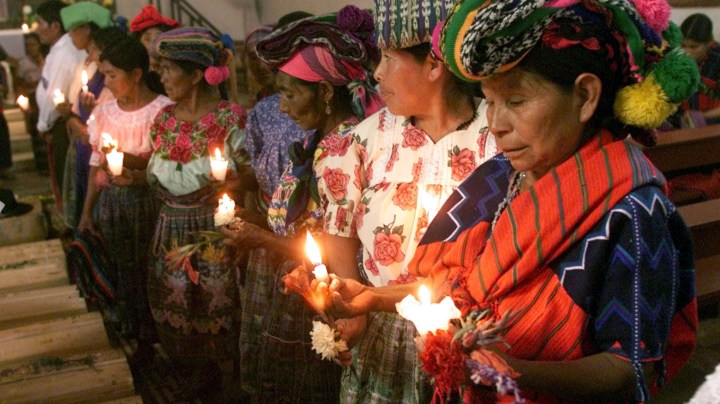La muerte no te absolverá #SiHuboGenocidio
— Cele Maltiox (@CeleMaltiox) April 2, 2018
Guatemalan Dictator Efraín Ríos’ Death Prompts Bitter Reflections on the War Crimes That Went Unpunished

Guatemalan Mayan Quiche Indian women pray as they burn candles around 41 coffins of victims, found in a 1980's clandestine cemetery. Photo by Andrea Nieto/Getty Images
Guatemalan dictator General Efraín Ríos Montt died Sunday at age 91. As obituaries of his life recount his crimes against humanity, many of those who families were affected by his cruelty are using social media to vocalize their exasperation that justice was never served. Despite committing genocide against Guatemala’s indigenous communities, Ríos Montt never served any time in prison.
In 1982 – in the midst of Guatemala’s brutal civil war – Ríos Montt and a few others successfully staged a coup in the Central American country. When Ríos Montt took power, he essentially hit a reset button on the political system; he annulled the 1965 constitution, suspended political parties, and he dissolved Congress. Former President Ronald Reagan held Ríos Montt in high esteem. After meeting him in 1982, Reagan said the Guatemalan leader was “getting a bum rap on human rights,” The New York Times reports.
But for many, that couldn’t be further from the truth. Montt took back territory occupied by leftist guerrillas through the combined use of civilian and military force, and this set off one of the most violent periods of Guatemala’s civil war. Guatemala nunca más and the Comisión de la Verdad estimate that during his 17 months in power, he committed about half of the crimes that took place across the entirety of the country’s 36-year civil war, according to journalist Irmalicia Velásquez Nimatuj. In the first half year of his rule, soldiers killed more than 10,000 – most of whom were Maya.
Ríos Montt used excessive force to quelch opposition, which included students, members of the Catholic church, and indigenous Ixil Maya people. Though many met violent ends, others sought refuge in the mountains and in Mexico. In Sepur Zarco, for example, the military first came for the men, Mayan leaders who were either killed or disappeared. Weeks later, they came back to further upend the lives of the 15 women. According to The Guardian, they raped women in front of their children, they burned their houses, and they made them move into shacks near their base. The women were forced to cook, clean, and submit to rape in 12-hour shifts.
For decades, Guatemala’s indigenous communities have sought justice. In 2013, a Guatemalan judge convicted him of trying to kill the Ixil ethnic group. The judge stated that Ríos knew about the murders and did nothing to stop it. The decision was overturned 10 days later. Before he died of a heart attack, he was being tried in absentia.
His death means that he will never pay for his crimes. And for many, the painful memories and traumas have not dissipated in the decades since his rule. Ríos Montt remains a divisive figure, with some hailing him as a leader. But Twitter – where the hashtag #SiHuboGenocidio is trending – is not letting the world forget about his war crimes. Check out a few messages below:
Muerto el perro NO SE ACABA LA RABIA X falta d justicia para las familias víctimas del #SiHuboGenocidio q algunos disfracen la indignación de derecha o izquierda NO LO ABSUELVE, sino que reivindican ignorancia histórica de hechos reales.
Justicia divina, clamor de los muertos. https://t.co/KAQ6TrZWaN
— José Jiménez (@josejimenezblue) April 2, 2018
#RiosMontt and his cronies were partly responsible for the repressive policies put in place in #Guatemala that led to my family and friends seeking refuge abroad, not to mention the #genocide of thousands of indigenous Guatemalans. He will not be missed. #SiHuboGenocidio 🇬🇹 https://t.co/GawCA7N3ON
— Cristian González Cabrera (@cristianfergo) April 2, 2018
#SiHuboGenocidio
Adiós Ríos Mont, esperamos que nunca mas vuelva a ver otro genocida como tú, tus simpatizantes solo eran niñatos de las ciudades donde nunca pasó nada, donde quiera que estés espero que sepas lo que hiciste , ya que #Guatemala no lo olvidará.— Jorge Taracena (@minicm94123) April 2, 2018
Escupo en su tumba #SiHuboGenocidio pic.twitter.com/NvXoX8Q4RF
— Brayan⚒️ALL (🧯BrA💥) (@BrayanAll) April 2, 2018
Con la memoria de los masacrados #SíHuboGenocidio pic.twitter.com/J61bVtg1aA
— Giovanni Frei Rodriguez (@carlosanchezurd) April 2, 2018
El dictador-genocida #RíosMontt ha muerto pero la tarea sigue vigente: Hacer justicia por el genocidio y garantizar que las nuevas generaciones no vuelvan a sufrir lo que sufrieron las comunidades mayas de Guatemala en los años 80 #SíHuboGenocidio #MiCorazónEsIxil https://t.co/civHXJrdPz
— Aron (@aronlindb) April 2, 2018
#SiHuboGenocidio y si no cree vayan a las áreas rurales y platiquen con los abuelitos.
— Cristian 🐸 (@Alvarz97_) April 2, 2018
No se cómo hacen para justificar que el Ríos Montt con el ejército hayan arrasado pueblos enteros, desarmados; violado y matado inocentes, mujeres y niños.
No entiendo tampoco cómo incluso algunos lo aplauden.De verdad no cabe en mi cabeza. #SiHuboGenocidio
— Chereré (@J03_LR) April 2, 2018